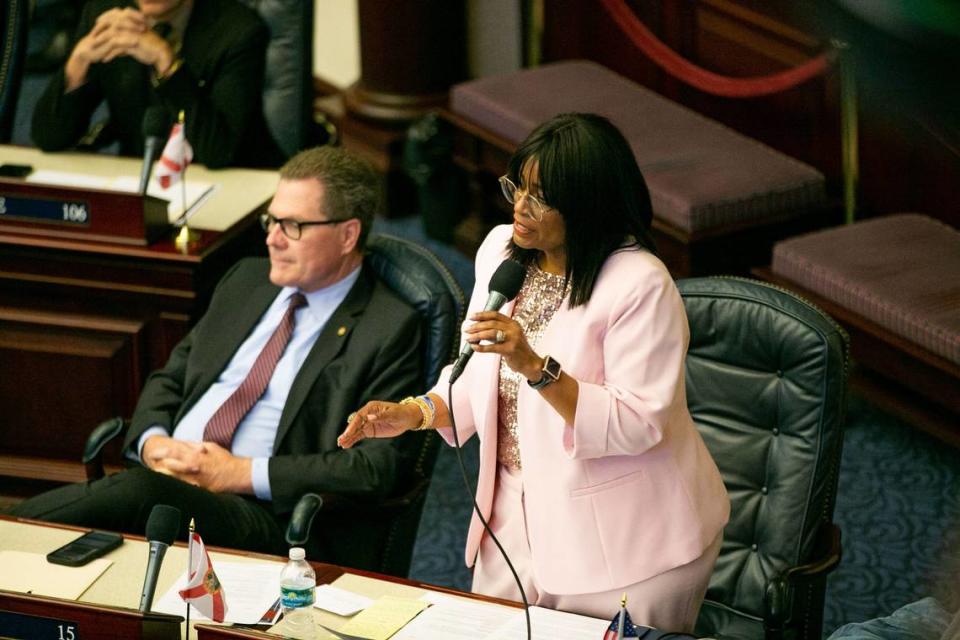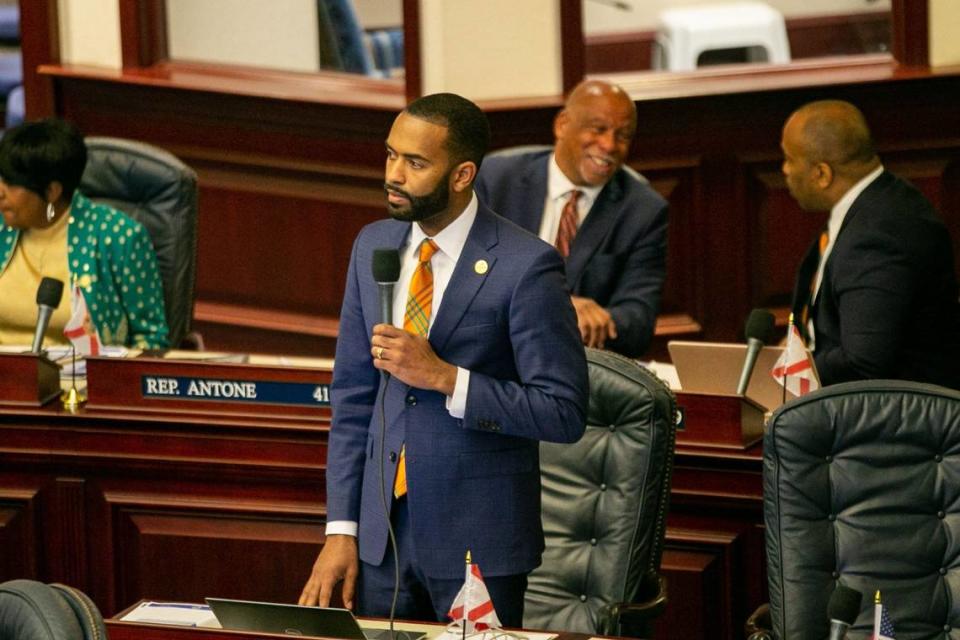Six-week abortion bill passes Florida House, goes to DeSantis for signature
Florida legislators signed off on a bill banning most abortions after six weeks of pregnancy, putting the fate of the measure in the hands of Gov. Ron DeSantis, who is all but certain to sign it.
Republicans in the House swatted down nearly 50 proposed amendments from Democrats before representatives voted 70-40 to approve the legislation Thursday, with seven Republicans voting alongside Democrats against it. Nine members did not vote. The Senate passed the bill earlier this month.
The measure, SB 300, could effectively eliminate most abortions in Florida.
Last year, about 82,000 abortions were performed in Florida. Sen. Erin Grall, R-Vero Beach, who sponsored the Senate legislation, said “very few abortions happen from zero to six weeks,” and that “there will be many tens of thousands of babies that are saved because of this law passing in Florida.”
READ MORE: Six things to know about what Florida’s six-week abortion ban means
Opponents of the bill, like Rep. Anna Eskamani, D-Orlando, said the measure would acutely impact the health and wellness of women, especially low-income women.
“I just can’t understand why we can’t find a consensus that forcing people to give birth is wrong and unpopular and not something this Legislature should do,” she said.
The nearly five-hour debate over the bill was at times intense Thursday, with lawmakers on both sides sharing personal stories.

Rep. Robin Bartleman, D-Weston, talked about praying on what she should do when she was told the fetus she was carrying had an abnormality. It was a wanted pregnancy, and in her excitement, she said she told her daughter that she would be getting a sibling.
Bartleman said no one in the Legislature belonged there with her, alongside her loved ones, when she was contemplating the future of her pregnancy. (She said that as she was deciding what to do, doctors discovered her fetus had no heartbeat.)
“This bill upsets me on so, so many levels,” she said.
Rep. Adam Anderson, R-Palm Harbor, spoke about how his son, Andrew John Anderson, died at age 4 from the rare genetic disease Tay-Sachs. He said managing his son’s care was difficult and said part of him can see how someone who gets that diagnosis might choose abortion. But he said his son’s life brought good to his life and the community.
“Don’t try to tell me that a baby is an obligation,” Anderson said. “A baby is a blessing, all babies are blessings, no matter how long or short their lives may be.”
Protesters disrupt House proceedings
At one point, a group of protesters threw pieces of paper and stickers with information about accessing medication abortion at home down on the representatives, interrupting proceedings. Sergeants cleared the gallery, and protesters took to the Capitol’s rotunda where a number of Democratic lawmakers joined them, singing “Lean on Me” and chanting.
The seven Republican members who voted against the bill largely came from South Florida, including Michael Caruso of Delray Beach; Peggy Gossett-Seidman of Highland Beach; Chip LaMarca of Lighthouse Point; Vicki Lopez of Miami, and Rick Roth of West Palm Beach.
Reps. Karen Gonzalez Pittman of Tampa and Sam Killebrew of Winter Haven also voted no.
No Democrats voted in favor of the bill.
The White House weighed in soon after the vote, with press secretary Karine Jean-Pierre saying in a statement that the legislation “flies in the face of fundamental freedoms and is out of step with the views of the vast majority of the people of Florida and of all the United States.”
The bill allows for some abortions after the six-week cutoff in cases of rape, incest and human trafficking. In those cases, women with documentation showing evidence of the crime can get abortions up to 15 weeks of pregnancy.

The legislation also keeps intact Florida’s current exceptions for abortions later in pregnancy when they’re medically necessary. In most cases, two physicians must certify that the pregnancy should be terminated to save the woman’s life or to avoid “substantial and irreversible” physical impairment.
Even if the governor signs the legislation, the bill would only take effect if the state Supreme Court rules in favor of Florida’s current law limiting most abortions to the first 15 weeks of pregnancy. A collection of abortion providers is challenging the law as unconstitutional, citing the state Constitution’s right to privacy clause. The state’s highest court has previously said that clause protects access to abortion. But DeSantis’ administration is seeking a reversal of the precedent.
Democrats’ amendments failed — in advance
Democrats filed about 50 amendments ahead of Thursday’s vote on the six-week abortion ban bill, including expanding the exceptions to include women facing domestic violence. But the amendments were doomed before the day started, with House Speaker Paul Renner saying they would all fail. Each amendment was given 2 1/2 minutes for discussion and debate.
Opponents of the bill have argued that it amounts to a near-total abortion ban because of Florida’s other abortion-related restrictions and because many women don’t realize they’re pregnant in those first six weeks.
Florida currently requires a 24-hour delay between a mandatory counseling appointment and the performance of the abortion, and both must be done in person by a physician.
For Planned Parenthood affiliates across Florida, it typically takes 15 to 22 days for a woman to access an abortion, from the point of requesting an appointment to when she is able to access the procedure, according to Damien Filer, a spokesperson for the organization.
At A Woman’s World Medical Center Inc. in Fort Pierce, the doctor who performs abortions is only at the clinic on Mondays and Saturdays, meaning women must wait more than 24 hours between their counseling and the performance of their abortion, said clinic founder Candace Dye.
If abortions are cut off after six weeks of gestation, Dye said women would have to come for their first counseling appointments no later than early into their fifth week of pregnancy.
”Women are going to start dying,” Dye said. “Because they can make abortion illegal but women are going to try and do it anyway one way or another.”
The bill passed Thursday also gives $25 million to the Florida Pregnancy Care Network Inc., which oversees a group of clinics that opponents commonly refer to as crisis pregnancy centers. The centers are designed to promote childbirth, according to state statute, and avoid counseling women on abortion as an option.
The legislation also prohibits state funds from being used to fund someone’s travel in order to access an abortion, and requires medication abortion be provided in person by a physician.


